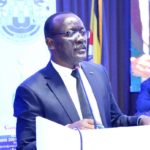Uganda through the National Water and Sewerage Corporation will next month host the 20th Africa Water Association (AfWA) International Congress & Exhibition (AfWA ICE).
The four-day event, which will run under the theme: Breaking grounds to accelerate access to water and sanitation for all will gather researchers, policymakers and various executives to discuss how the continent can solve problems of water scarcity and stress, through innovations and diplomatic efforts.
According to officials, the event will be held at Kampala Serena Hotel’s Conference Centre from Feb. 24-27.
The conference is hosted every two years.
The 19th AfWA ICE was held in Bamako, Mali in February 2018 and that’s when it was decided that Kampala becomes the next host.
NWSC executive director Dr. Eng. Silver Mugisha is the president of the Congress.
The African Water Association (AfWA) is a professional association of establishments, enterprises and utilities operating in the areas of drinking water, sanitation and environment in Africa.
Sub-Saharan Africa suffers from chronically overburdened water systems under increasing stress from fast-growing urban areas.
“Weak governments, corruption, mismanagement of resources, poor long-term investment, and a lack of environmental research and urban infrastructure only exacerbate the problem,” argues Christopher Tatlock in a blog post on Cfr.org.
Experts define water stress as “economic, social, or environmental problems caused by unmet water needs”.
Lack of supply is often caused by contamination, drought, or disruption in distribution.
The Joint Monitoring Programme for Water Supply and Sanitation set up by the World Health Organization (WHO) and United Nations Children’s Fund (UNICEF) defines safe drinking water as “water with microbial, chemical and physical characteristics that meets WHO guidelines or national standards on drinking water quality.”
Sub-Saharan Africa had the largest number of water-stressed countries of any other place on the planet and of an estimated 800 million people who live in Africa, 300 million live in a water-stressed environment.
It is estimated that by 2030, 75 million to 250 million people in Africa will be living in areas of high water stress, which will likely displace anywhere between 24 million and 700 million people as conditions become increasingly unlivable.
In Uganda, numerous efforts are being taken to address the problem of unsafe water.
For instance, NWSC announced that it will soon be commissioning the first and biggest plant in East and Central Africa using dissolved air flotation water treatment technology.
It is being constructed in Katosi and it will be using AquaDAF and AquaZur water treatment technologies, officials revealed.
NSWC Senior Manager Infrastructure planning and Development Eng. Sulum Taremwa said they are now moving away from the traditional treatment of water by sedimentation to the use of dissolved air floatation, in order to deal with the problem of increasing algae on Lake Victoria.








